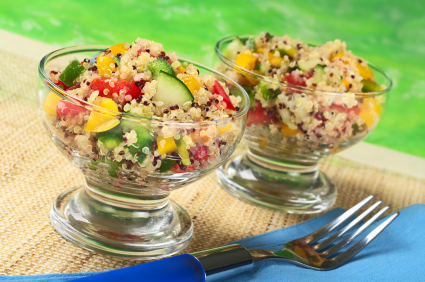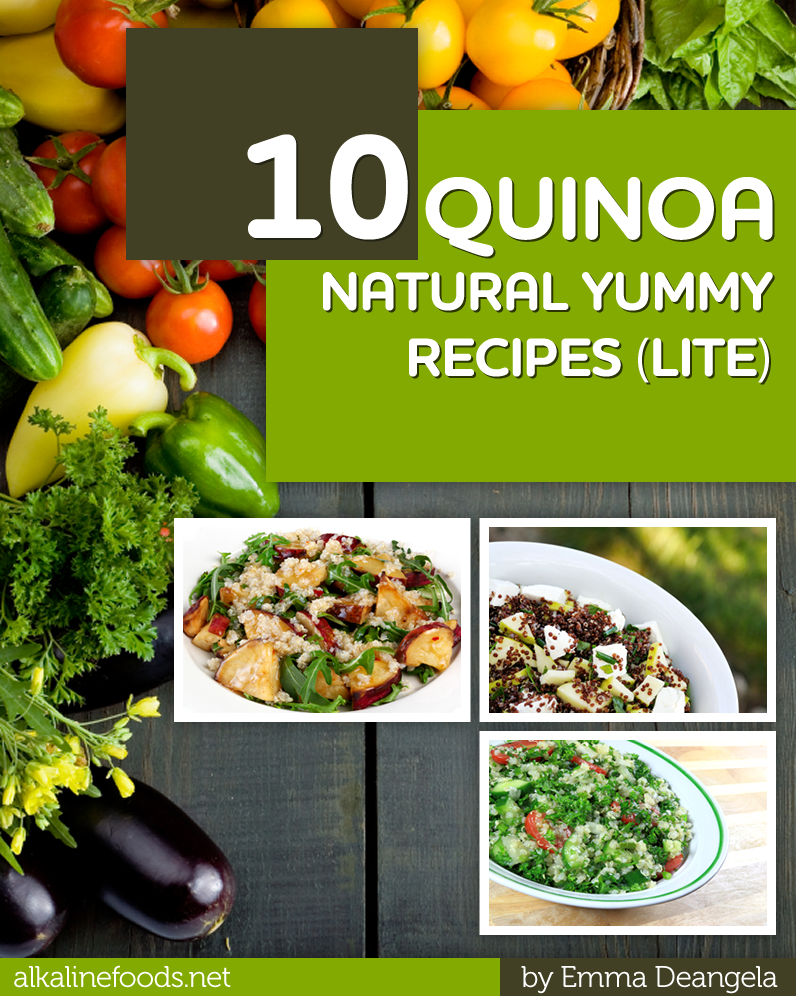 Quinoa has recently become a popular substitute for people who are avoiding gluten and wheat products. Quinoa is a seed which has been consumed for thousands of years in South America, primarily Bolivia and Peru.
Quinoa has recently become a popular substitute for people who are avoiding gluten and wheat products. Quinoa is a seed which has been consumed for thousands of years in South America, primarily Bolivia and Peru.
The ancient Aztec people used quinoa as a staple in their diet and it provided sustainable energy for their warriors. In traditional societies, new moms often consume quinoa in order to increase their breast milk supply. In fact, since quinoa has become so readily available, new mothers who are having trouble getting enough breast milk to their newborns can easily adopt this practice of consuming more quinoa for increased lactation.
Quinoa is often grouped into the classification of a whole grain but this is not an accurate classification. Quinoa is the seed of a leafy green plant, related to spinach and Swiss chard plants. It is properly classified as a pseudo cereal rather than a traditional cereal grain because it does not come from grass plants, as do whole wheat grains.
Quinoa is considered a super food by some because of the high amount of complete protein it contains and also because it is rich in B-vitamins and minerals. Having a large amount of complete protein makes it a great choice for vegetarians, since it will provide a portion of the daily protein intake amount that is important for rebuilding and repairing muscle tissue.
Quinoa contains concentrated amounts of antioxidant phytonutrients, which gives it the ability to support against inflammation and free radicals in the body. Quinoa also contains some heart-healthy fats, such as the omega-3 fatty acid, alpha-linolenic acid.The biggest reason that quinoa is considered such a healthy food is due to the combination of all of the aforementioned nutritional benefits being found in a single food. Quinoa is also considered a low glycemic index food, which helps keep blood sugar levels stable. Keeping the blood sugar stable helps the body to maintain a healthy weight and healthy cholesterol levels.
Quinoa is considered a gluten-free food and is thought to be safe for those with Celiac Disease, but individuals should always monitor their responses to foods instead of completely relying on mainstream information. There are a couple of reasons for this.
First, there have been issues with the cross-contamination of grains and quinoa in processing plants. An option to avoid this is to purchase quinoa that has been processed or cleaned in a facility that does not process gluten-containing grains.
Another reason to monitor individual responses to quinoa is because these seeds also contain an innate biological pesticide similar to the lectins in wheat. As mentioned before, modern wheat has been modified in order to have increased amounts of protein and the wheat lectins were inadvertently increased as well.
Quinoa has not undergone such modification, so the amount of lectins in the quinoa may not have the same negative effects on people. But recent studies have proven that some people with Celiac Disease still have autoimmune responses to some types of quinoa. Therefore, just because quinoa is considered gluten-free, it is important to monitor any unfavorable bodily responses or to test quinoa for an allergic response.
Once you conclude for yourself that quinoa is a healthy addition to your diet, you will need to know how to prepare it to maximize taste and nutritional value.
Different Types of Quinoa & How to Cook it
The first thing to note is that there are three common colors of quinoa available. Red, ivory, and black quinoa seeds are available, but while the red seems to better maintain its shape and texture after being cooked, there is no known nutritional difference between the different types.
In order to reap the benefits of quinoa, begin by rinsing it in warm water. Quinoa has a natural pesticide on the outside that is called saponin and may cause the quinoa to be bitter if it is not rinsed off. Then cook one part quinoa and two parts water, or the liquid or broth of your choice. Bring the mixture to a boil and then reduce the heat, cover, and cook. It will take approximately 15 minutes for one cup of quinoa to cook.
The cooked quinoa can be used in dishes that traditionally use rice, or even in recipes that contain bulgur wheat, such as tabbouleh. Many people enjoy quinoa that has been cooked with milk or dairy substitute as breakfast porridge adding nuts, dried fruits, and spices such as cinnamon.
Quinoa can also be sprouted. Start by rinsing off the saponins, then pour water over the seeds, and drain the water after thirty minutes. This process should be repeated every 8 to 12 hours until the seeds have sprouted. Sprouted quinoa is a very nutritious and tasty addition to salads.
Now that you know how to cook quinoa, here’s your access to your quinoa recipe book!
10 Quinoa Natural Yummy Recipes (Lite)
To access your free recipe book, click the link above, then right-click on the document and “Save As…” to download it.
If you love these 10 quinoa recipes, you will love our Alkaline Cook Package too! Click the button below to get your Alkaline Gourmet Package!
About the Author:
Emma Deangela is the best selling author of The Alkaline Diet Program and 80/20 Fat Loss. She has helped over tens of thousands of men and women to lose weight and transform their health with sound nutrition advice.
Which wonderful friends in your life would appreciate these quinoa recipes? Are they aware of this super grain, Quinoa?
Please help them by sharing this eye-opening article with each of them using any of the social media and email buttons below.


Leave a Reply